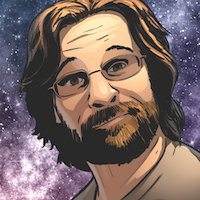Stereotypical.
I love subverting stereotypes when I’m writing characters. More than anything I love typically brutish characters in intellectual professions. Put an orc in a wizard’s outfit and I’m a happy fellow. Turning a stereotype on its head is easy to do, too! Consider the first thing that comes to mind when you imagine goblins, ogres, dragons, and other such creatures. Take that first thought, say “nope!” and do something completely different. Congratulations! You’re taking a character in a new direction! Whether that direction works is an entirely different discussion.
In the fantasy genre, this is supremely easy to do. Whether through folklore, tabletop gaming, novels, video games, or TV and movies, we have a general idea of what the “monsters” of fantasy are supposed to be like. We all know that goblins are weak but cruel and are dangerous in large numbers, and that orcs are violent brutes who would conquer the world if they only possessed the intellect to organize themselves, and so on. Even the traditional fantasy hero races have their own stereotypes. Elves are immortal guardians of the forest, dwarves live deep in the mountains, and so on. Once again, take the first thing that comes to mind and go “nope!” You’ll have intellectual orcs, dwarves who live on beaches, and artisan goblins in no time.
In the science fiction genre, this is trickier to do. Unlike the fantasy genre, there are no “standard” races to build your story upon. The aliens of one sci-fi setting are going to be completely different from the aliens of another. The one “standard” race in science fiction is us, the humans. But there is no “typical” when it comes to humans in science fiction. Like aliens, what humans are like in one sci-fi setting is going to be vastly different than another. Whether it’s Star Trek’s ultimately optimistic view of humanity’s future, the complex and conquering empire of Frank Herbert’s DUNE, or the sprawling roller coaster of ups-and-downs in Isaac Asimov’s Foundation Trilogy, there are more variations in science fiction than I can list in one blog entry.
When Garth and I were establishing the setting of STAR POWER, we wanted to subvert some stereotypes of humanity in science fiction but were faced with the aforementioned lack of stereotypes. So we turned to trends, and we noticed a few things about humanity in a lot of current science fiction: that our future is going to be bleak, dirty, a tyranny, or a downright apocalypse; that we’re “the new kids” in the galactic community and we’re out to prove ourselves; that humans are the most adaptable interstellar species who are capable of experiencing emotions in ways the cold, elder races of the galaxy have forgotten; we’ll sleep with anything (and are biologically capable of doing so). We decided to work with those, modifying some and scrapping others, and are happy with our version of humanity in the Millennium Federation.
In STAR POWER, humanity was on the brink of apocalypse but they ultimately got their act together. We’re proud of our optimistic, Star Trek-like take on humanity in that regard. The Humans aren’t the newest race to enter the Federation, because that honor goes to the Jeranians. They’re not known for being the most adaptable, because that honor belongs to the Ladori (Kaylo Durin’s people), and we were never fans of the “most emotional” trend so we scrapped that altogether. Humans are famous not for being adaptable, but for their aforementioned history of violence. The other races of the Federation see Humans as “the orcs” (for lack of a better term) who managed to rehabilitate themselves. As for the sleeping with anything business? There hasn’t been much romance(!) in STAR POWER yet, but we’ve been hinting that cross-species relationships aren’t really a thing in our setting.
Are we subverting stereotypes with our humans, or have we just turned some trends on their heads? Is there even a stereotype to subvert when it comes to humans in science fiction? Whatever the case may be, we’re proud of our take on humanity, and we hope it gives you some hope for our future.
